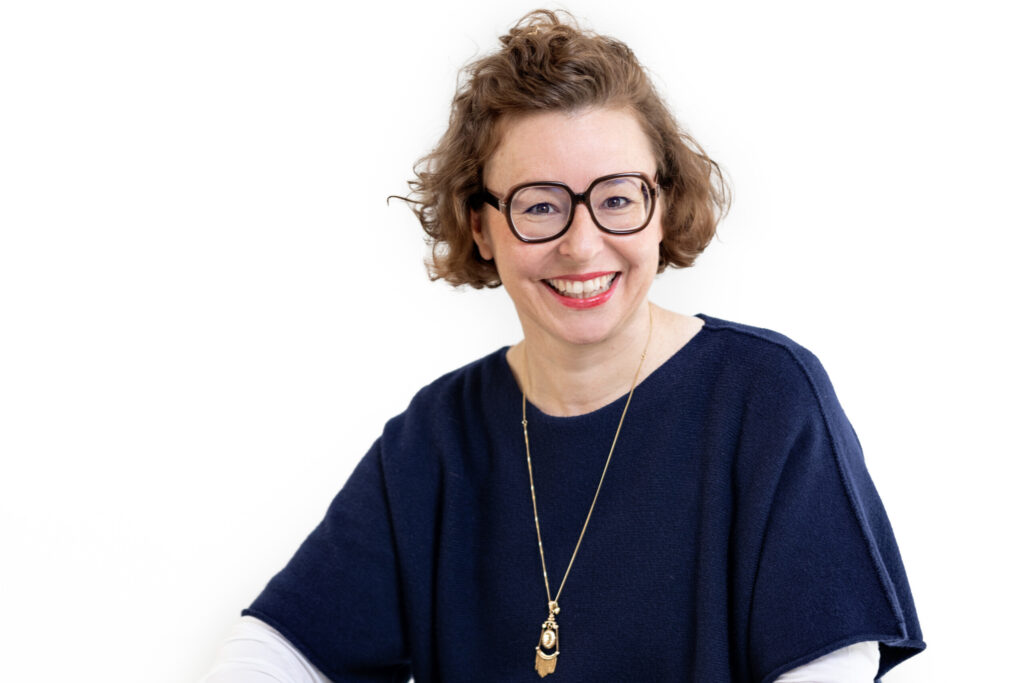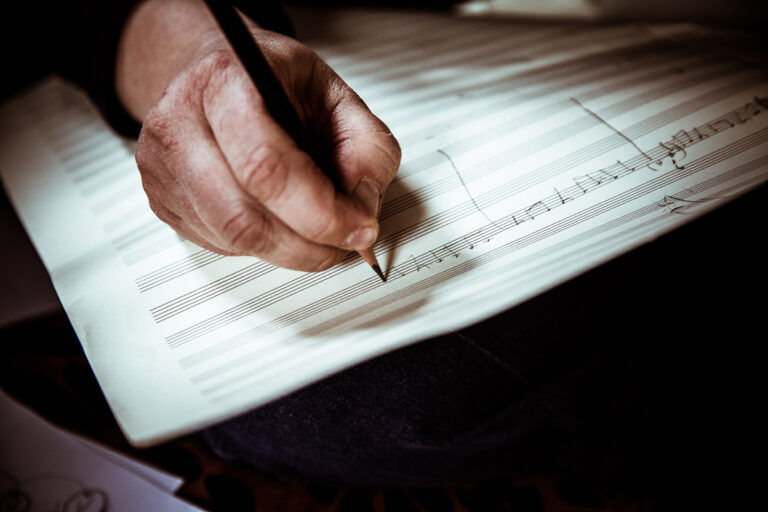Take just a few steps outside Einsiedeln railway station and you will see a shop window with “jodel.ch” written in large letters. Nadja Räss is clearly not afraid of new media and does not regard yodelling as a pure tradition that can only be taught in practice. In this small shop, she and her team teach yodelling in various formats, even online, and also offer yodelling-specific voice training. On her website, she explains that she was leaving “the dusty image of yodelling” behind. Furthermore, that such lessons teach “traditional singing as a timeless and versatile form of expression on the basis of sound vocal training”.
Career aspiration: yodeller
Nadja Räss’ origins explain her love of yodelling, but also her stylistic openness. She was born and grew up in Einsiedeln in the canton of Schwyz. However, neither of her parents are from Einsiedeln; they met and fell in love there. “While neither of my parents are musicians, they played music as a hobby. And there was always music at home, especially yodelling music, and I was obviously always singing.” Nadja wanted to be a yodeller even as a child. At least that’s what she’s told is what happened. But she knows for sure that she came into close contact with yodelling as a small child, and not just with the Central Swiss tradition.
“As an Appenzeller, my father and his brothers continued the custom of Silvesterklausen (walking from door to door, in a traditional costume, wishing the dwellers luck and yodelling while doing so), which is why we often travelled to Appenzell when I was very young.” She probably didn’t realise this and later they didn’t go back there. But she realised it at the age of about 18, when she went to the Silvesterklausen for the first time in a long time. “That gave me a real sense of déjà vu. I think the Silvesterklausen had a big impact on me. Because it involves a totally archaic and direct kind of yodelling.”
But there was still a long way for her to go to become a professional yodeller. “I went to grammar school with the intention that a school-leaving certificate wouldn’t be a bad thing if I wanted to make music my profession.” Her parents made it possible for her to go to the private monastery school in Einsiedeln instead of the cantonal school in Pfäffikon (Schwyz). “Of course, I knew that there was a cool choir there that sings Gregorian chants. To be able to sing there once a week, however, I had to serve at the altar and turn up at 6.30 am.”
A captivating combination
At the time, Nadja Räss was told by various people that music was an unprofitable and strict profession – there was no way around a “real” job. She thought about becoming a primary school teacher, took a look around and realised: “Nope that’s definitely not for me”. Catering was also an option; she still enjoys being a hostess today. “But I realised that you have to work at the weekend, so I couldn’t yodel anymore.” A combination of music and pedagogy emerged as an impressive combination. And so, after graduating from high school, she studied classical singing at the Zurich University of the Arts, graduating in 2005 with a master’s degree in pedagogy. From 2012 to 2017, she was artistic director of the cultural institution “Klangwelt Toggenburg.” A “passionate teacher”, she not only passes on her knowledge at “jodel.ch” courses but has also been a professor of yodelling at Lucerne University of Applied Sciences and Arts since autumn 2018.
But how do classical singing and yodelling go together? “More than 20 years ago, you couldn’t get a sound didactic education by studying jazz singing, so I studied classical vocal pedagogy.” How has this changed your way of singing? “On the one hand, it has expanded the range of my voice and my musical horizons enormously. I was suddenly singing pieces that were harmonically much more complex – and longer; until then I had only sung yodelling songs that lasted a maximum of four minutes.” What she found difficult at the beginning were the two different approaches to music. “In classical music, everything is specified in a neat and organised manner. The composer writes every emotion into the note. But when it came to yodelling, I was conditioned by listening, as it is shaped by an oral tradition.”
“I convey to the students that it is exciting and enriching when these two levels of access come together. Accordingly, my students also have to transcribe natural yodelling and write out the vocalisation.” Nadja Räss has also benefited herself as a professor of yodelling. “The moment I explain something to someone, I have to think very carefully about how I do it myself.” As early as during her own studies, she realised that many things came naturally to her because she had grasped them automatically through her childhood learning.
A case for the voice doctor
This led to a rediscovery of her voice, explains Nadja Räss. And this ultimately led to the teaching material “Yodelling – Theory & Practice” created with Franziska Wigger. “We also carried out voice analyses because many questions arose, for example: What is happening anatomically? Is it true that you can ruin your voice by yodelling?” To this end, she worked together with voice specialists. And the learning process has not stopped to this day. “I’m now also allowed to teach specialised didactics, i.e. teach my students how to teach. That is a lovely process: seeing how things progress.”
The intellectual approach through the yodelling study programme also encountered a certain resistance, especially as it also enabled an expansion of the expressive spectrum and thus a deviation from tradition. “When the degree programme was new, there were difficult and gruelling situations, and resistance came from the yodelling scene in particular. But this arose out of fear, because people didn’t know what would be taught and how. And of course, university and yodelling, that sounds like a contradiction in terms, which is why it became the catchphrase.”
A game with timbres (or colours)
At some point, she realised that the problem was also due to the fact that people didn’t know what was on offer in this degree programme, which wasn’t so clear at the beginning. The situation has calmed down since then, explains Nadja Räss, partly because they are better informed. “We don’t want to water down the tradition or mix it with others. But it is important to me that a student from Thurgau, for example, also has an idea of Muotathal natural yodelling. Maybe one day a Muotathaler will come to her for a lesson and say he has voice problems.”
But might it not be tempting to sing in the Muotathal style and then add an Appenzeller timbre? “When I sing traditional pieces, I try to stay as close to them as possible. But when I sing new compositions, it is precisely these new colourings that flow into them. It’s like a palette of sounds and colours, and this palette has grown over the years, there are many shades of colour. It’s a game with the colour of the voice that happens unconsciously.” Nadja Räss also emphasises that new compositions are very important for keeping the tradition alive. “They are an important sign that folk music is constantly evolving. I believe we can draw from this. But in order to allow the new plants to grow, it is also important to know and nurture the roots.”
New compositions are mostly collaborative works
When Nadja Räss writes new music, she is usually very lucky to have other musicians involved. “This creates collaborative works while playing. As a duo with Markus Flückiger, we spent a long time playing around and trying things out to come up with the new programme.” With Rita Gabriel, she says, she always thinks very carefully about an arrangement. Nadja Räss emphasises that this approach is “an incredibly beautiful process” for her. And yes, this also has a social quality for her.
“For me, the most important thing is who I do a project with.” The trio with Outi Pulkkinen from Finland and Mariana Sadovska from Ukraine was formed over ten years ago. We were also on tour with it, but then the project was cancelled because of Covid-19 and later because of the war in Ukraine. “But as they are not just fellow singers, but also friends, we decided to give it another go together. We have developed a new programme, for which we have written some pieces ourselves, but have also commissioned a Ukrainian, a Swiss and a Finnish composer. That’s how very different pieces came together.”
Being part of a long tradition
Nadja Räss has already received several awards, including the “Prix Walo” for the “Yodelling” category in 2014 and was nominated for the Swiss Music Prize in 2016. Now, with the “Goldener Violinschlüssel 2025”, she is joining a long list of greats of Swiss folk music dating back to 1979. “What I feel particularly honoured by is that I am now on a list that includes some role models who have been important to my career. Willi Valotti is very, very important to me. I have a long musical friendship with him: I’ve been allowed to perform and sing with him since I was about 15 years old, which is still very, very formative for me today.” From him, she learnt to listen very carefully to the peculiarities of different yodelling traditions. “Without Willi Valotti and his new songs, I wouldn’t be standing here today – and being honoured.”
www.goldenerviolinschluessel.ch Website of the Golden Treble Clef Association
www.nadjaraess.ch Website of Nadja Räss
www.jodel.ch Website of Nadja Räss and her team for yodelling lessons
SUISA supports the “Goldener Violinschluessel” association. It has been granting awards for this in the field of Swiss folk music since 1979.




